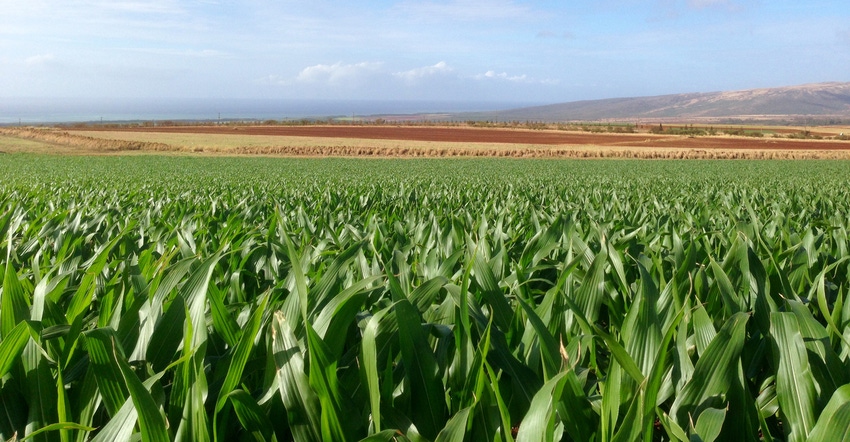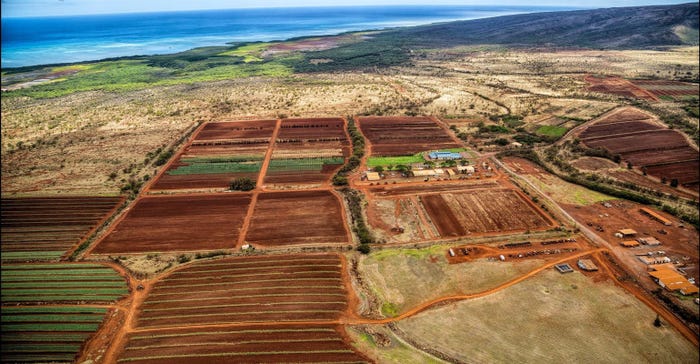
There is no Walmart or Rural King where Bart Lofton works. Kids attend a single public high school. He looks out the window and sees fields of lush green farmland and bright blue skies. It is like any Midwestern small farming town, except it is an island in the Pacific Ocean, and it's Bayer’s seed production facility.
Lofton grew up in Indiana and spent time in the Midwestern states of Iowa and Missouri before his job took him to the small island Molokai, Hawaii. He oversees the operations for both the larger island of Oahu and Molokai, which has a population of 7,000 people.
“It’s a very rural island that has a strong, deeply rooted culture of family involvement in agriculture,” Lofton explains. “They have generations — their dad, mom, uncle, auntie — who worked in agriculture.”
The company was one of the first seed companies to establish a corn-seed production facility on the island of Molokai in the 1960s. Today, it is the only one remaining.
There is high-quality agricultural land in Hawaii, something not mentioned in many travel brochures. However, Lofton, who is Bayer regional lead on the island, says there is not a great deal of corn production on that land.
“So for us, when you think about quality and purity, it is a great place for us to operate as far as maintaining distance from other corn production and pollen flow," he says. "It gives us a lot of confidence and purity in the quality of our seed.”
Bayer recently spent millions here buying a new seed production facility it expects to be fully operational in the next two years. It is an investment, Lofton says, that benefits the future of corn genetics, mainland U.S. farmers and this small island.
Advancing corn breeding
The Molokai facility produces seeds for Bayer corn breeders across North America. “The seeds we receive are from breeders developing and selecting corn genetics that are fit to survive the heat, cold or pests,” Lofton explains, “whatever the environment, whether Nebraska, Minnesota, Ohio or Texas.”
Plant breeders select seeds and send them to Hawaii to grow throughout the winter months. In the tropical environment, corn can grow all year. “That’s the beauty of being here,” he adds.
Workers plant the handful from researchers and tend to them during all growth stages. After harvest, Lofton sends the corn seed back to Bayer’s breeders. However, just like any farming operation, there are a few challenges to producing seed, even on a tropical island.

The Bayer Crop Science seed corn production facility in Molokai, Hawaii, is one that farmers traveling to the islands act to visit. For Bayer regional lead Bart Lofton, he enjoys showing them around this rural island.
“We don’t have a killing frost or freeze,” Lofton says. “And you can imagine the insects are not in check.” Bayer adheres to a robust, integrated pest management system. Still, it often is not enough. So, the company actually creates what Lofton calls an “artificial winter.”
“We cease production for certain amounts of time to create breaks between our cropping cycles to allow the correction of those pest cycles,” he explains.
Lofton says this type of seed production facility allows the company to ramp up the volume of corn breeders have to work with. “This eventually feeds that pipeline, so we can get those genetics and those traits to the customer, to the farmer.”
Farmers top of mind
Bayer is providing corn seeds with a broad selection of traits with the newest and latest germplasm, Lofton says. These seeds can go on to offer higher yield potential or lower production risk. That helps a farmer’s bottom line.
“If we can get that to them faster operating here in Hawaii, we can get them the highest genetic gain, the best trait combinations, that give them the tools to operate efficiently,” he says.
There is no delay in waiting until the next summer to grow out new seed traits. “We can turn that around more quickly and get it back to the mainland for final production and delivery to the farmer,” Lofton says. “It’s about providing more choices for farmers.”
Bayer is committed to bringing the latest and greatest genetics to farmers, he notes, but the company also is devoted to rural communities.
Investing in people
Workers at the Molokai facility are children of those who started with Bayer’s seed production facility more than 60 years ago. “It’s generational,” Lofton says. “It is a sense of pride and commitment.”
Still, the company does not take this small rural farming community for granted. From supporting local 4-H programs to the high school, Bayer invests in the town where its employees live.
“We are committed to this community,” Lofton says, “to the people here. It gives them a sense of comfort and confidence knowing we are expanding.”
For Lofton, that connection that the agriculture industry offers is what living and working in a rural community is all about — whether in a small town in the Midwest or an island in the ocean.
About the Author(s)
You May Also Like






